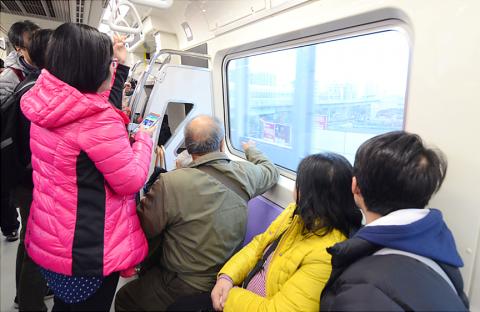The Taoyuan International Airport MRT Line is to officially launch today following a one-month trial, with passengers to get a 50 percent discount on tickets for the first month.
Taoyuan Metro Corp statistics showed that approximately 1.27 million passengers accessed the airport line during the trial run.
Taoyuan Metro, which operates the line, said that the 50 percent discount would begin today and end on April 1.

Photo: CNA
Based on the pricing scheme the company announced earlier this year, the base fare on the line is NT$30, with the most expensive ticket costing NT$160.
Every ticket sold would pay the same half-price fare during the deal, Taoyuan Metro said.
The line is to operate from 6am to 11pm daily, with nighttime hours reserved for maintenance.
However, Taoyuan Metro said it has asked the Ministry of Transportation and Communications about extending operating hours if operations go smoothly.
The system offers express services and regular services, with trains colored purple and blue respectively.
The express service has four passenger carriages and one luggage carriage and stops only at Taipei Main Station (A1), New Taipei Industrial Park Station (A3), Chang Gung Memorial Hospital Station (A8), Airport Terminal One Station (A12) and Airport Terminal Station (A13). The entire trip takes about 35 minutes.
The regular service makes stops at every station and takes about 70 minutes.
Among the 21 stations, Sanchong (A2) and New Taipei Industrial Park (A3) provide direct transfers to the Taipei MRT system.
The Taoyuan HSR Station (A18) connects to the high-speed rail system, allowing people traveling from central and southern Taiwan to transfer from a high-speed rail train to reach Taiwan Taoyuan International Airport.
The airport line offers in-town baggage check-in services for airline passengers and free Wi-Fi.

DEFENSE: The National Security Bureau promised to expand communication and intelligence cooperation with global partners and enhance its strategic analytical skills China has not only increased military exercises and “gray zone” tactics against Taiwan this year, but also continues to recruit military personnel for espionage, the National Security Bureau (NSB) said yesterday in a report to the Legislative Yuan. The bureau submitted the report ahead of NSB Director-General Tsai Ming-yen’s (蔡明彥) appearance before the Foreign and National Defense Committee today. Last year, the Chinese People’s Liberation Army (PLA) conducted “Joint Sword-2024A and B” military exercises targeting Taiwan and carried out 40 combat readiness patrols, the bureau said. In addition, Chinese military aircraft entered Taiwan’s airspace 3,070 times last year, up about

The Overseas Community Affairs Council (OCAC) yesterday announced a fundraising campaign to support survivors of the magnitude 7.7 earthquake that struck Myanmar on March 28, with two prayer events scheduled in Taipei and Taichung later this week. “While initial rescue operations have concluded [in Myanmar], many survivors are now facing increasingly difficult living conditions,” OCAC Minister Hsu Chia-ching (徐佳青) told a news conference in Taipei. The fundraising campaign, which runs through May 31, is focused on supporting the reconstruction of damaged overseas compatriot schools, assisting students from Myanmar in Taiwan, and providing essential items, such as drinking water, food and medical supplies,

A magnitude 4.3 earthquake struck eastern Taiwan's Hualien County at 8:31am today, according to the Central Weather Administration (CWA). The epicenter of the temblor was located in Hualien County, about 70.3 kilometers south southwest of Hualien County Hall, at a depth of 23.2km, according to the administration. There were no immediate reports of damage resulting from the quake. The earthquake's intensity, which gauges the actual effect of a temblor, was highest in Taitung County, where it measured 3 on Taiwan's 7-tier intensity scale. The quake also measured an intensity of 2 in Hualien and Nantou counties, the CWA said.

New Party Deputy Secretary-General You Chih-pin (游智彬) this morning went to the National Immigration Agency (NIA) to “turn himself in” after being notified that he had failed to provide proof of having renounced his Chinese household registration. He was one of more than 10,000 naturalized Taiwanese citizens from China who were informed by the NIA that their Taiwanese citizenship might be revoked if they fail to provide the proof in three months, people familiar with the matter said. You said he has proof that he had renounced his Chinese household registration and demanded the NIA provide proof that he still had Chinese